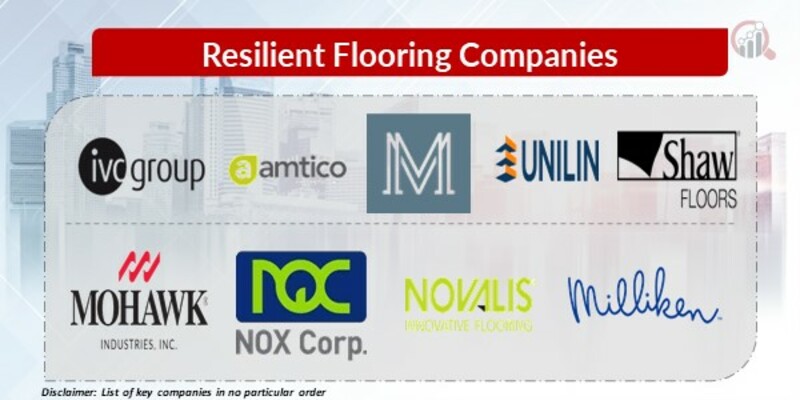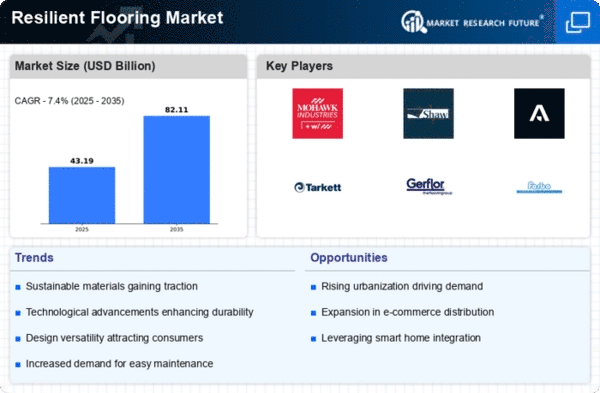Top Industry Leaders in the Resilient Flooring Market
 Let's delve into the key players, their tactics, and the factors influencing market share, along with a glimpse into the latest industry news and developments.
Let's delve into the key players, their tactics, and the factors influencing market share, along with a glimpse into the latest industry news and developments.
Market Masters: Key Players and Strategies
A Hong Kong Company named Novalis in March 2020, decided to introduce a new manufacturing unit of luxury vinyl tile, by investing USD 30 million. Here, the company is aimed at making USD 30 million. Here the company used advanced technology for manufacturing rigid luxury tiles.
Some of the hypermarket key players, like Lulu Group, invested USD 270 million in establishing 15 new markets during the market forecast period.
Tarkett SA on January 25, 2018, invested a huge sum for expanding their resilient flooring business. This expansion took place basically in the region of Europe and some of the North American regions. Here are the key player’s applied strategies of about USD 50 million in the Alabama production unit. Some of the other production units include Luxembourg, Poland, the North American region, and many more.
Interface Inc in March 2020, has manufactured luxury tiles under the renounceable brand name "Brush line". The company has manufactured this product with the help of 39% recycled material. The company also deals with the production of certain LVT products like Level Set, Studio Set, and Criterion.
Dominating the market are established giants like Mohawk Industries, Shaw Industries, Armstrong Flooring, and Mannington Mills. These players hold significant market share through broad product portfolios catering to various price points and application segments. Their strategies involve aggressive channel expansion, brand recognition through marketing campaigns, and continuous product development focusing on sustainability and technological advancements.
Emerging players like Forbo Flooring Systems and Karastan are carving their niche through specialization in specific product types like luxury vinyl tiles (LVT) and high-performance commercial flooring. Their focus on innovative designs, eco-friendly materials, and direct-to-consumer sales helps them stand out.
Factors Shaping Market Share: A Balancing Act
Several factors influence market share in this dynamic arena:
-
Product Diversity: Offering a variety of flooring options, from budget-friendly vinyl sheets to premium LVT, caters to diverse consumer needs and preferences. -
Sustainability: The growing demand for eco-friendly materials like recycled PVC and bio-based options gives an edge to companies with sustainable practices. -
Technological Innovation: Incorporation of advanced features like soundproofing, anti-bacterial coatings, and integrated smart technology distinguishes brands at the forefront. -
Distribution Channels: Strong relationships with retailers, online platforms, and direct-to-consumer models play a crucial role in reaching customers. -
Pricing Strategies: Balancing competitive pricing with product quality and brand value is essential for attracting and retaining customers.
List of the key major global companies operating in the Resilient Flooring Market are
- IVC Group of Belgium
- Amtico International Co. Ltd of the United Kingdom
- Mannington Mills Ltd of the United States
- Unilin of Belgium
- Mohawk Industries of the United States
- NOX Corporation
- Shaw Floors of the United States
- Novalis of the United States
- Milliken and Company of the United States
- Nora of Germany and many more.
Recent Developments:
-
AHF Products acquired Armstrong Flooring Incorporated in July 2022. It is a US-based company that manufactures and markets floors. Consequently, this will enable AHF Products to increase its manufacturing facilities and expand its customer base.
Beaulieu International Group (BIG) bought Signature Floors in May 2023, which is one of the leading names in home and office floor solutions for New Zealand and Australia, respectively, thus opening avenues for further expansion across these two markets.
In June 2022, Mohawk Industries Inc. announced about entering into an agreement with Grupo Industriel Saltillo (GIS), where they would purchase the Vitromex ceramic tile business of the company that would help strengthen their Mexican segment.
In December 2023, Karndean Designflooring, a leading LVT supplier, purchased Go Resilient Canada luxury vinyl flooring assets; this transaction resulted in creating Karndean Designflooring Canada as the company expands distribution and operations in North America.
In October 2023, Forbo Flooring Systems entered into a partnership with the Flooring Industry Training Association (FITA) to offer specialized training courses on linoleum floorcoverings installation called Marmoleum meant for upskilling fitters who work with them.
Marilo vinyl tiles, which are an economical kind of resilient flooring suitable for different spaces and environments were launched in November 2022.
Beaulieu International Group acquired Signature Floors, aiming to strengthen its presence in New Zealand and Australia’s resilient flooring segment in April 2023.
February 2024: sustainability came first for Mohawk Industries with its PureTech range that features PVC-free waterproof construction comprising 70% recycled contents and an organic renewable core representing approximately eighty percent. The step indicates an enormous shift towards eco-friendly, sustainable improvements among the players operating within the Resilient Flooring Market.
AHF Products introduced Ingenious Plank across various brands in February 2024, including Armstrong Flooring, Bruce and Robbins. Representing an alternative to regular SPC and made without PVC, this hybrid resilient flooring reflects the industry’s direction toward sustainable and environmentally friendly options.











